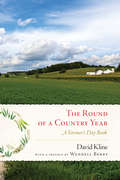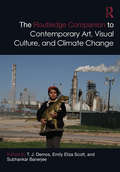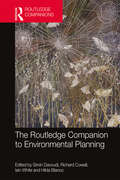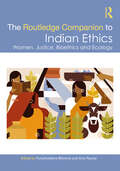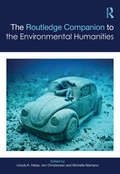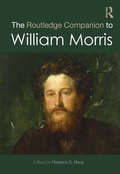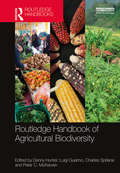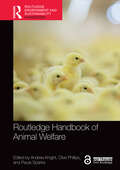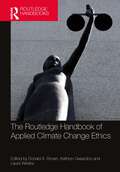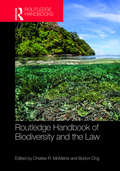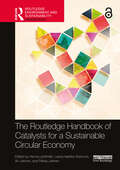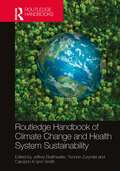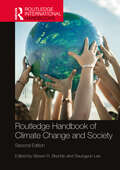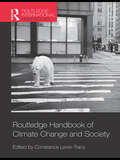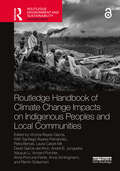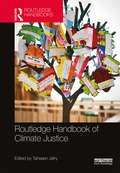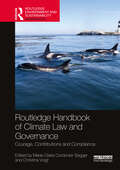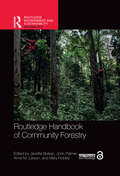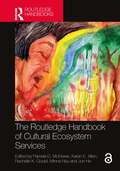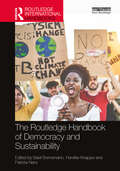- Table View
- List View
Round of a Country Year: A Farmer's Day Book
by David KlineDavid Kline has been called a "twentieth–century Henry David Thoreau" by his friends and contemporaries; an apt comparison given the quiet exuberance with which he records the quotidian goings–on on his organic family farm. Under David's attentive gaze and in his clear, insightful prose the reader is enveloped in the rhythms of farm life; not only the planting and harvesting of crops throughout the year, but the migration patterns of birds, the health and virility of honeybees left nearly to their own devices, the songs and silences of frogs and toads, the disappearance and resurgence of praying mantises in fields–turned woodlands, the search for monarch butterflies in the milkweed. There's rhythm in community, too—neighbors gathering to plant potatoes or to maintain an elderly friend's tomato garden, organic farming conferences and meetings around family dining tables or university panels.Interspersed with local lore (when the spring's first bumblebee appears the children can go barefoot) is deep technical knowledge of cultivation and land management and the hazards of modern agri–business. Kline records statewide meetings of district supervisors, knows which speakers and committee chairmen are in the pockets of the oil and gas lobbyists, stands up and says his part.At a time when America's population is being turned toward the benefits of small, local farming practices on our health and our environment, Kline's daybook offers a striking example of the ways in which we are connected to our environment, and the pleasure we can take in daily work and stewardship.
The Routledge Companion to Contemporary Art, Visual Culture, and Climate Change (Routledge Art History and Visual Studies Companions)
by T. J. Demos Emily Eliza Scott Subhankar BanerjeeInternational in scope, this volume brings together leading and emerging voices working at the intersection of contemporary art, visual culture, activism, and climate change, and addresses key questions, such as: why and how do art and visual culture, and their ethics and values, matter with regard to a world increasingly shaped by climate breakdown? Foregrounding a decolonial and climate-justice-based approach, this book joins efforts within the environmental humanities in seeking to widen considerations of climate change as it intersects with social, political, and cultural realms. It simultaneously expands the nascent branches of ecocritical art history and visual culture, and builds toward the advancement of a robust and critical interdisciplinarity appropriate to the complex entanglements of climate change. This book will be of special interest to scholars and practitioners of contemporary art and visual culture, environmental studies, cultural geography, and political ecology.
The Routledge Companion to Environmental Planning (Routledge International Handbooks)
by Simin Davoudi Richard Cowell Iain White Hilda BlancoThis Companion presents a distinctive approach to environmental planning by: situating the debate in its social, cultural, political and institutional context; being attentive to depth and breadth of discussions; providing up-to-date accounts of the contemporary practices in environmental planning and their changes over time; adopting multiple theoretical and analytical lenses and different disciplinary approaches; and drawing on knowledge and expertise of a wide range of leading international scholars from across the social science disciplines and beyond. It aims to provide critical reviews of the state-of-the-art theoretical and practical approaches as well as empirical knowledge and understandings of environmental planning; encourage dialogue across disciplines and national policy contexts about a wide range of environmental planning themes; and, engage with and reflect on politics, policies, practices and decision-making tools in environmental planning. The Companion provides a deeper understanding of the interdependencies between the themes in the four parts of the book (Understanding ‘the environment’, Environmental governance, Critical environmental pressures and responses, and Methods and approaches to environmental planning) and its 37 chapters. It presents critical perspectives on the role of meanings, values, governance, approaches and participations in environmental planning. Situating environmental planning debates in the wider ecological, political, ethical, institutional, social and cultural debates, it aims to shine light on some of the critical journeys that we have traversed and those that we are yet to navigate and their implications for environmental planning research and practice. The Companion provides a reference point mapping out the terrain of environmental planning in an international and multidisciplinary context. The depth and breadth of discussions by leading international scholars make it relevant to and useful for those who are curious about, wish to learn more, want to make sense of, and care for the environment within the field of environmental planning and beyond.
The Routledge Companion to Indian Ethics: Women, Justice, Bioethics and Ecology
by Purushottama Bilimoria Amy RaynerThis companion volume focuses on the application and practical ramifications of Indian ethics. Here Indian dharma ethics is moved from its preeminent religious origins and classical metaethical proclivity to, what Kant would call, practical reason – or in Aristotle’s poignant terms, ēhikos and phronēis –and in more modern parlance normative ethics. Our study examines a wide range of social and normative challenges facing people in such diverse areas as women’s rights, infant ethics, politics, law, justice, bioethics and ecology. As a contemporary volume, it builds linkages between existing theories and emerging moral issues, problems and questions in today’s India in the global arena. The volume brings together contributions from some 40 philosophers and contemporary thinkers on practical ethics, exploring both the scope and boundaries or limits of ethics as applied to everyday and real-life concerns and socio-economic challenges facing India in the context of a troubled globalizing world. As such, this collection draws on multiple forms of writing and research, including narrative ethics, interviews, critical case studies and textual analyses.The book will be of interest to scholars, researchers and students of Indian philosophy, Indian ethics, women and infant issues, social justice, environmental ethics, bioethics, animal ethics and cross-cultural responses to dominant Western moral thought. It will also be useful to researchers working on the intersection of Gandhi, sustainability, ecology, theology, feminism, comparative philosophy and dharma studies.
The Routledge Companion to Joseph Conrad (Routledge Literature Companions)
by Debra Romanick BaldwinThe Routledge Companion to Joseph Conrad attests to the global significance and enduring importance of Conrad’s works, reception, and legacy.This volume brings together an international roster of scholars who consider his works in relation to biography, narrative, politics, women’s studies, comparative literature, and other forms of art. They offer approaches as diverse as re-examining Conrad’s sea voyages using newly available digital materials, analyzing his archipelagic narrative techniques, applying Chinese philosophy to Lord Jim, interrogating gendered epistemology in the neglected story “The Tale,” considering Conrad alongside W.E.B. Du Bois, Graham Greene, Virginia Woolf, or Orhan Pamuk, or alongside sound, gesture, opera, graphic novels, or contemporary events.An invaluable resource for students and scholars of Conrad and twentieth-century literature, this groundbreaking collection shows how Conrad’s works – their artistry, vision, and ideas – continue to challenge, perplex, and delight.
The Routledge Companion to the Environmental Humanities (Routledge Literature Companions)
by Jon Christensen Michelle Niemann Ursula K. HeiseThe Routledge Companion to the Environmental Humanities provides a comprehensive, transnational, and interdisciplinary map to the field, offering a broad overview of its founding principles while providing insight into exciting new directions for future scholarship. Articulating the significance of humanistic perspectives for our collective social engagement with ecological crises, the volume explores the potential of the environmental humanities for organizing humanistic research, opening up new forms of interdisciplinarity, and shaping public debate and policies on environmental issues. Sections cover: The Anthropocene and the Domestication of Earth Posthumanism and Multispecies Communities Inequality and Environmental Justice? Decline and Resilience: Environmental Narratives, History, and Memory Environmental Arts, Media, and Technologies The State of the Environmental Humanities The first of its kind, this companion covers essential issues and themes, necessarily crossing disciplines within the humanities and with the social and natural sciences. Exploring how the environmental humanities contribute to policy and action concerning some of the key intellectual, social, and environmental challenges of our times, the chapters offer an ideal guide to this rapidly developing field.
The Routledge Companion to William Morris (Routledge Art History and Visual Studies Companions)
by Florence S. BoosWilliam Morris (1834–96) was an English poet, decorative artist, translator, romance writer, book designer, preservationist, socialist theorist, and political activist, whose admirers have been drawn to the sheer intensity of his artistic endeavors and efforts to live up to radical ideals of social justice. This Companion draws together historical and critical responses to the impressive range of Morris’s multi-faceted life and activities: his homes, travels, family, business practices, decorative artwork, poetry, fantasy romances, translations, political activism, eco-socialism, and book collecting and design. Each chapter provides valuable historical and literary background information, reviews relevant opinions on its subject from the late-nineteenth century to the present, and offers new approaches to important aspects of its topic. Morris’s eclectic methodology and the perennial relevance of his insights and practice make this an essential handbook for those interested in art history, poetry, translation, literature, book design, environmentalism, political activism, and Victorian and utopian studies.
The Routledge Companion to William Morris (Routledge Art History and Visual Studies Companions)
by Florence S. BoosWilliam Morris (1834–96) was an English poet, decorative artist, translator, romance writer, book designer, preservationist, socialist theorist, and political activist, whose admirers have been drawn to the sheer intensity of his artistic endeavors and efforts to live up to radical ideals of social justice. This Companion draws together historical and critical responses to the impressive range of Morris’s multi-faceted life and activities: his homes, travels, family, business practices, decorative artwork, poetry, fantasy romances, translations, political activism, eco-socialism, and book collecting and design. Each chapter provides valuable historical and literary background information, reviews relevant opinions on its subject from the late-nineteenth century to the present, and offers new approaches to important aspects of its topic. Morris’s eclectic methodology and the perennial relevance of his insights and practice make this an essential handbook for those interested in art history, poetry, translation, literature, book design, environmentalism, political activism, and Victorian and utopian studies.
Routledge Handbook for Creative Futures (Routledge Environment and Sustainability Handbooks)
by Gabrielle Donnelly Alfonso MontuoriAs the uncertainty of global and local contexts continues to amplify, the Routledge Handbook for Creative Futures responds to the increasing urgency for reimagining futures beyond dystopias and utopias. It features essays that explore the challenges of how to think about compelling futures, what these better futures might be like, and what personal and collective practices are emerging that support the creation of more desirable futures. The handbook aims to find a sweet spot somewhere between despair and naïve optimism, neither shying away from the massive socio-environmental planetary challenges currently facing humanity nor offering simplistic feel-good solutions. Instead, it offers ways forward—whether entirely new perspectives or Indigenous and Traditional Knowledge perspectives that have been marginalized within modernity—and shares potential transformative practices. The volume contains contributions from established and emerging scholars, practitioners, and scholar-practitioners with diverse backgrounds and experiences: a mix of Indigenous, Black, Asian, and White/Caucasian contributors, including women, men, and trans people from around the world, in places such as Kenya, India, US, Canada, and Switzerland, among many others. Chapters explore critical concepts alongside personal and collective practices for creating desirable futures at the individual, community, organizational, and societal levels. This scholarly and accessible book will be a valuable resource for researchers and students of leadership studies, social innovation, community and organizational development, policy studies, futures studies, cultural studies, sociology, and management studies. It will also appeal to educators, practitioners, professionals, and policymakers oriented toward activating creative potential for life-affirming futures for all.
Routledge Handbook of Agricultural Biodiversity (Routledge Environment and Sustainability Handbooks)
by Danny Hunter Luigi Guarino Charles Spillane Peter C. McKeownThe world relies on very few crop and animal species for agriculture and to supply its food needs. In recent decades, there has been increased appreciation of the risk this implies for food security and quality, especially in times of environmental change. As a result, agricultural biodiversity has moved to the top of research and policy agendas. This Handbook presents a comprehensive overview of our current knowledge of agricultural biodiversity in a series of specially commissioned chapters. It draws on multiple disciplines including plant and animal genetics, ecology, crop and animal science, food studies and nutrition, as well as social science subjects which explore the socio-economic, cultural, institutional, legal and policy aspects of agricultural biodiversity. It focuses not only on the core requirements to deliver a sustainable agriculture and food supply, but also highlights the additional ecosystem services provided by a diverse and resilient agricultural landscape and farming practices. The book provides an indispensable reference textbook for a wide range of courses in agriculture, ecology, biodiversity conservation and environmental studies.
Routledge Handbook of Animal Welfare (Routledge Environment and Sustainability Handbooks)
by Andrew Knight, Clive Phillips, and Paula SparksThis handbook presents a much-needed and comprehensive exploration of the rapidly growing fields of animal welfare and law. In recent years there has been increasing attention paid to our complex, multifaceted relationships with other animals, and in particular, the depth and breadth of various societal uses of animals. This has led to a reconsideration of their moral and social status, which has sometimes challenged the interests of those who use animals. In such a contested domain, sound evidence and reasoning become particularly important. Through firm commitment to such principles, this book explores the biological foundations for the moral consideration of animals and for evolving conceptualisations of animal welfare. It reviews in detail the welfare concerns associated with numerous forms of animal use. The inclusion of key recent developments such as climate change, pandemics, and antimicrobial resistance, ensures this text is among the most current in its field. The ethical implications of the various uses of animals by society are considered, and chapters provide important recommendations for reforms of practice, law, or policy. The status of animal law internationally, and in major world regions, is reviewed. Finally, the book considers human behavioural change and strategies for improving stakeholder communication and education. The handbook is essential reading for students and scholars of animal welfare, animal law and animal ethics everywhere, and for policy-makers and other professionals working in the animal welfare sector.
The Routledge Handbook of Applied Climate Change Ethics (Routledge Handbooks in Applied Ethics)
by Donald A. Brown Kathryn Gwiazdon Laura WestraThe Routledge Handbook of Applied Climate Change Ethics is a powerful reference source for the identification and exploration of the underlying ethical issues in climate change law and policy. Bridging theory with practice, it takes ethical engagement out of the classroom and into the halls of governance. The Handbook‘s 39 chapters--written by a diverse and inter-disciplinary team of experts from around the world--are case studies divided into five parts. Parts I-IV highlight the ethical issues that arise in climate change policy formation, from duties not to harm to duties to consider the views and voices of those who will be, or are being, harmed; from the role of human rights, justice, and democracy to how to identify and respond to disinformation and denialism. It also raises the ethics of various policy responses, such as cap-and-trade, carbon taxing, and geo-engineering. Part V offers a way forward, with strategies on how to expressly consider ethics in climate change policy formation, from negotiations to education, media, communication, and the power and potential of shaming. The volume is essential reading for students, professors, and practitioners who wish to better engage with government and non-government organizations on climate policy, to better understand the practical application of the theory and philosophy of ethics, and how to more strongly draft and defend ethical action in negotiating, drafting, and defending climate change law and policy.
Routledge Handbook of Biodiversity and the Law
by Charles R. McManis Burton OngThis volume provides a reference textbook and comprehensive compilation of multifaceted perspectives on the legal issues arising from the conservation and exploitation of non-human biological resources. Contributors include leading academics, policy-makers and practitioners reviewing a range of socio-legal issues concerning the relationships between humankind and the natural world. The Routledge Handbook of Biodiversity and the Law includes chapters on fundamental and cutting-edge issues, including discussion of major legal instruments such as the Convention on Biological Diversity and the Nagoya Protocol. The book is divided into six distinct parts based around the major objectives which have emerged from legal frameworks concerned with protecting biodiversity. Following introductory chapters, Part II examines issues relating to conservation and sustainable use of biodiversity, with Part III focusing on access and benefit-sharing. Part IV discusses legal issues associated with the protection of traditional knowledge, cultural heritage and indigenous human rights. Parts V and VI focus on a selection of intellectual property issues connected to the commercial exploitation of biological resources, and analyse ethical issues, including viewpoints from economic, ethnobotanical, pharmaceutical and other scientific industry perspectives.
The Routledge Handbook of Catalysts for a Sustainable Circular Economy (Routledge Environment and Sustainability Handbooks)
by Hanna Lehtimäki Leena Aarikka-Stenroos Ari Jokinen Pekka JokinenThis groundbreaking handbook leads the way in accelerating the transition to a sustainable circular economy by introducing the concept of a catalyst as a positive and enhancing driving force for sustainability. Catalysts create and maintain favourable conditions for complex systemic sustainability transition changes, and a discussion and understanding of catalysts is required to move from a linear economy to a sustainable and circular economy. With contributions from leading experts from around the globe, this volume presents theoretical insights, contextualised case studies, and participatory methodologies, which identify different catalysts, including technology, innovation, business models, management and organisation, regulation, sustainability policy, product design, and culture. The authors then show how these catalysts accelerate sustainability transitions. As a unique value to the reader, the book brings together public policy and private business perspectives to address the circular economy as a systemic change. Its theoretical and practical perspectives are coupled with real-world case studies from Finland, Italy, China, India, Nigeria, and others to provide tangible insights on catalysing the circular economy across organisational, hierarchical, and disciplinary boundaries. With its broad interdisciplinary and geographically diverse scope, this handbook will be a valuable tool for researchers, academics, and policy-makers in the fields of circular economy, sustainability transitions, environmental studies, business, and the social sciences more broadly.
The Routledge Handbook of Catalysts for a Sustainable Circular Economy (Routledge Environment and Sustainability Handbooks)
by Hanna Lehtimäki Leena Aarikka-Stenroos Ari Jokinen Pekka JokinenThis groundbreaking handbook leads the way in accelerating the transition to a sustainable circular economy by introducing the concept of a catalyst as a positive and enhancing driving force for sustainability. Catalysts create and maintain favourable conditions for complex systemic sustainability transition changes, and a discussion and understanding of catalysts is required to move from a linear economy to a sustainable and circular economy.With contributions from leading experts from around the globe, this volume presents theoretical insights, contextualised case studies, and participatory methodologies, which identify different catalysts, including technology, innovation, business models, management and organisation, regulation, sustainability policy, product design, and culture. The authors then show how these catalysts accelerate sustainability transitions. As a unique value to the reader, the book brings together public policy and private business perspectives to address the circular economy as a systemic change. Its theoretical and practical perspectives are coupled with real-world case studies from Finland, Italy, China, India, Nigeria, and others to provide tangible insights on catalysing the circular economy across organisational, hierarchical, and disciplinary boundaries.With its broad interdisciplinary and geographically diverse scope, this handbook will be a valuable tool for researchers, academics, and policy-makers in the fields of circular economy, sustainability transitions, environmental studies, business, and the social sciences more broadly.The Open Access version of this book, available at http://www.taylorfrancis.com, has been made available under a Creative Commons Attribution-Non Commercial-No Derivatives (CC-BY-NC-ND) 4.0 license.
Routledge Handbook of Climate Change and Health System Sustainability
by Jeffrey Braithwaite Yvonne Zurynski Carolynn K-lynn SmithThe Routledge Handbook on Climate Change and Health System Sustainability takes the reader on a journey to understand the interconnectedness of human health, climate change, and healthcare systems.The book begins by exploring how climate change is affecting human health through the increasing frequency of natural disasters, such as bush fires, droughts and heatwaves, and the emergence of new infectious diseases, such as the SARS-CoV2 virus, all of which drive up demand for health services that are already heavily burdened by increasing rates of chronic diseases and ageing populations. Chapters then turn to the contribution of the healthcare system itself to climate change— explaining how current clinical practices, including wasteful care of low value, create an unsustainable carbon footprint and threaten the very viability of healthcare systems. Throughout the volume, descriptions of practical solutions and implemented case studies are used to illustrate the feasibility of taking action in the real world of the healthcare delivery ecosystem.Bringing together a mix of forward-thinking environmental and health researchers, policymakers, leaders, managers, clinicians, patients, and health industry leaders to clarify the current state and future of sustainable healthcare systems, this book will be of interest to researchers and policymakers of climate and health systems.
Routledge Handbook of Climate Change and Society (Routledge International Handbooks)
by Steven R. Brechin Seungyun LeeRoutledge Handbook of Climate Change and Society is a comprehensive guide that provides insights into the multifaceted relationship between climate change and society and covers a wide array of topics, disciplines, and cultures, from the latest trends in weather patterns to the issue of climate (in)justice. The second edition, which is overwhelmingly comprised of all-new essays, is an indispensable resource for those interested in understanding the complexities of climate change and its societal implications.The book contains seven thematically organized sections examining the various aspects of climate change and its intersection with our society: Climate Change in the Natural and Social Sciences; Human Population, Movement, and Health; Economics, Energy, and Consumption; Urban Climate Resiliency; Technological Innovations and Pitfalls; Gender, Poverty, and Justice; and Politics and Governance. Each part provides a unique and important perspective for understanding the challenges as well as opportunities presented by climate change.Through original research findings and critical analysis, this book sheds light on the urgent need for interdisciplinary approaches to tackle climate change effectively. By examining the intersectionality of climate change with various social, economic, and political factors, it offers valuable insights for researchers, policymakers, activists, and anyone concerned about the future of our planet. With a forward-looking perspective that emphasizes optimism and resilience, this book serves as a tool for fostering hope and collective action in the face of climate change challenges.
Routledge Handbook of Climate Change and Society (Routledge International Handbooks)
by Constance Lever-TracyAs the time-scales of natural change accelerate and converge with those of society, Routledge Handbook of Climate Change and Society takes the reader into largely uncharted territory in its exploration of anthropogenic climate change. Current material is used to highlight the global impact of this issue, and the necessity for multidisciplinary and global social science research and teaching to address the problem. The book is multidisciplinary and worldwide in scope, with contributors spanning specialisms including agro-forestry, economics, environmentalism, ethics, human geography, international relations, law, politics, psychology, sociology and theology. Their global knowledge is reflected in the content of the text, which encompasses chapters on American, European and Chinese policies, case studies of responses to disasters and of the new technological and lifestyle alternatives that are being adopted, and the negotiations leading up to the Copenhagen conference alongside a preface assessing its outcomes. Starting with an initial analysis by a leading climatologist, key issues discussed in the text include recent findings of natural scientists, social causation and vulnerability, media and public recognition or scepticism, and the merits and difficulties of actions seeking to mitigate and adapt. This accessible volume utilizes a wealth of case studies, explains technical terms and minimises the use of acronyms associated with the subject, making it an essential text for advanced undergraduates, postgraduate students and researchers in the social sciences.
Routledge Handbook of Climate Change Impacts on Indigenous Peoples and Local Communities (Routledge Environment and Sustainability Handbooks)
by Victoria Reyes-GarcíaThis Handbook examines the diverse ways in which climate change impacts Indigenous Peoples and local communities and considers their response to these changes. While there is well-established evidence that the climate of the Earth is changing, the scarcity of instrumental data oftentimes challenges scientists’ ability to detect such impacts in remote and marginalized areas of the world or in areas with scarce data. Bridging this gap, this Handbook draws on field research among Indigenous Peoples and local communities distributed across different climatic zones and relying on different livelihood activities, to analyse their reports of and responses to climate change impacts. It includes contributions from a range of authors from different nationalities, disciplinary backgrounds, and positionalities, thus reflecting the diversity of approaches in the field. The Handbook is organised in two parts: Part I examines the diverse ways in which climate change – alone or in interaction with other drivers of environmental change – affects Indigenous Peoples and local communities; Part II examines how Indigenous Peoples and local communities are locally adapting their responses to these impacts. Overall, this book highlights Indigenous and local knowledge systems as an untapped resource which will be vital in deepening our understanding of the effects of climate change. The Routledge Handbook of Climate Change Impacts on Indigenous Peoples and Local Communities will be an essential reference text for students and scholars of climate change, anthropology, environmental studies, ethnobiology, and Indigenous studies.
Routledge Handbook of Climate Change Impacts on Indigenous Peoples and Local Communities (Routledge Environment and Sustainability Handbooks)
by Victoria Reyes-GarcíaThis Handbook examines the diverse ways in which climate change impacts Indigenous Peoples and local communities and considers their response to these changes.While there is well-established evidence that the climate of the Earth is changing, the scarcity of instrumental data oftentimes challenges scientists’ ability to detect such impacts in remote and marginalized areas of the world or in areas with scarce data. Bridging this gap, this Handbook draws on field research among Indigenous Peoples and local communities distributed across different climatic zones and relying on different livelihood activities, to analyse their reports of and responses to climate change impacts. It includes contributions from a range of authors from different nationalities, disciplinary backgrounds, and positionalities, thus reflecting the diversity of approaches in the field. The Handbook is organised in two parts: Part I examines the diverse ways in which climate change – alone or in interaction with other drivers of environmental change – affects Indigenous Peoples and local communities; Part II examines how Indigenous Peoples and local communities are locally adapting their responses to these impacts. Overall, this book highlights Indigenous and local knowledge systems as an untapped resource which will be vital in deepening our understanding of the effects of climate change.The Routledge Handbook of Climate Change Impacts on Indigenous Peoples and Local Communities will be an essential reference text for students and scholars of climate change, anthropology, environmental studies, ethnobiology, and Indigenous studies.The Open Access version of this book, available at www.taylorfrancis.com, has been made available under a Creative Commons Attribution-Non Commercial-No Derivatives (CC-BY-NC-ND) 4.0 license.
Routledge Handbook of Climate Justice (Routledge Environment and Sustainability Handbooks)
by Tahseen Jafry Michael Mikulewicz Karin HelwigThe term "climate justice" began to gain traction in the late 1990s following a wide range of activities by social and environmental justice movements that emerged in response to the operations of the fossil fuel industry and, later, to what their members saw as the failed global climate governance model that became so transparent at COP15 in Copenhagen. The term continues to gain momentum in discussions around sustainable development, climate change, mitigation and adaptation, and has been slowly making its way into the world of international and national policy. However, the connections between these remain unestablished. Addressing the need for a comprehensive and integrated reference compendium, The Routledge Handbook of Climate Justice provides students, academics and professionals with a valuable insight into this fast-growing field. Drawing together a multidisciplinary range of authors from the Global North and South, this Handbook addresses some of the most salient topics in current climate justice research, including just transition, urban climate justice and public engagement, in addition to the field’s more traditional focus on gender, international governance and climate ethics. With an emphasis on facilitating learning based on cutting-edge specialised climate justice research and application, each chapter draws from the most recent sources, real-world best practices and tutored reflections on the strategic dimensions of climate justice and its related disciplines. The Routledge Handbook of Climate Justice will be essential reading for students and scholars, as well as being a vital reference tool for those practically engaged in the field.
Routledge Handbook of Climate Law and Governance: Courage, Contributions and Compliance
by Marie-Claire Cordonier Segger Christina VoigtCourage, Contributions and Compliance: The Routledge Handbook of Climate Law and Governance recognises calls from the United Nations (UN), the Intergovernmental Panel on Climate Change (IPCC). The elders, and others, for climate justice and urgent action, and convenes insights from leading legal and institutional experts, professors, professionals and early career scholars on emerging climate law and policy challenges, commitments and solutions.The collection explores the role of law and governance in scaling up global responses to climate change and advancing sustainability. Based on careful study of international advances and the full spectrum of Nationally Determined Contributions (NDCs) to the global response to climate change, as submitted by Paris Agreement Parties to the UN Framework Convention on Climate Change (UNFCCC), the volume compiles a compelling, coherent and systematic topical account from across diverse legal jurisdictions. Analytical chapters by leading experts, practitioners and scholars close to ongoing climate negotiations explore recent legal and institutional innovations related to climate change which can support implementation and compliance with the Paris Agreement and advance the global Sustainable Development Goals (SDGs). They highlight ways to raise ambition through law and policy, to reform national legal and institutional arrangements to implement NDCs and to further develop international law and governance in the face of the existential threat of climate change and the world: sustainable development commitments.Presenting a pathway for advancing climate ambition in the coming decades, this book will be of interest to government officials, academics, students, professionals and policy makers working in the area of climate law and governance.
Routledge Handbook of Community Forestry (Routledge Environment and Sustainability Handbooks)
by Janette Bulkan, John Palmer, Anne M. Larson, and Mary HobleyThis handbook provides a comprehensive overview and cutting-edge assessment of community forestry. Containing contributions from academics, practitioners, and professionals, the Routledge Handbook of Community Forestry presents a truly global overview with case studies drawn from across Africa, Asia, Europe, and the Americas. The Handbook begins with an overview of the chapters and a discussion of the concept of community forestry and the key issues. Topics as wide-ranging as Indigenous forestry, conservation and ecosystem management, relationships with industrial forestry, trade and supply systems, land tenure and land grabbing, and climate change are addressed. The Handbook also focuses on governance, looking at the range of approaches employed, including multi-level governance and rights-based approaches, and the principal actors involved from local communities and Indigenous Peoples to governments and national and international non-governmental organisations. The Handbook reveals the importance of the historical context to community forestry and the effects of power and politics. Importantly, the Handbook not only focuses on successful examples of community forestry, but also addresses failures in order to highlight the key challenges we are still facing and potential solutions. The Routledge Handbook of Community Forestry is essential reading for academics, professionals, and practitioners interested in forestry, natural resource management, conservation, and sustainable development.
The Routledge Handbook of Cultural Ecosystem Services
by Jun He Pamela D. McElwee Karen E. Allen Rachelle K. Gould Minna HsuThe Routledge Handbook of Cultural Ecosystem Services provides an overview of Cultural Ecosystem Services (CES), which are the nonmaterial aspects of benefits that people derive from nature. These diverse and multifaceted contributions can include experiences, capabilities, and identities, among others. The Handbook addresses how these CES are valued, how they reflect human-nonhuman relationships, and what roles they can play in improved human well-being, ecosystem management, and trajectories towards sustainability.This Handbook presents a wide array of perspectives on the roles CES can play in understanding relationships to nature, and on how those relationships might translate into policy. The Handbook includes philosophical approaches to CES, typologies and classifications of types of CES, and case studies of places, people, policies and projects engaging CES. Across seven distinctive Parts, the chapters deliver a number of important practical lessons on how to understand, measure, and value CES, and use examples and applications from around the world, including how CES apply across different biomes. The Handbook also includes a selection of compelling artworks that represent CES in different cultural contexts. The 91 authors represent 19 different countries, providing a rich range of experiences, including a strong focus on the Global South.This book can serve as a comprehensive guide to researchers who are new to CES and wish to understand more about the field, and as a set of go-to instructions for experienced CES researchers. It can also inform policymakers who wish to better incorporate CES into their work.The Open Access version of this book, available at http://www.taylorfrancis.com, has been made available under a Creative Commons Attribution-Non Commercial-No Derivatives (CC BY-NC-ND) 4.0 license
The Routledge Handbook of Democracy and Sustainability (Routledge Environment and Sustainability Handbooks)
by Basil BornemannThis handbook provides comprehensive and critical coverage of the dynamic and complex relationship between democracy and sustainability in contemporary theory, discourse, and practice. Distinguished scholars from different disciplines, such as political science, sociology, philosophy, international relations, look at the present state of this relationship, asking how it has evolved and where it is likely to go in the future. They examine compatibilities and tensions, continuities and changes, as well as challenges and potentials across theoretical, empirical and practical contexts. This wide-spanning collection brings together multiple established and emerging viewpoints on the debate between democracy and sustainability which have, until now, been fragmented and diffuse. It comprises diverse theoretical and methodological perspectives discussing democracy’s role in, and potential for, coping with environmental issues at the local and global scales. This handbook provides a comprehensive overview of arguments, claims, questions, and insights that are put forward regarding the relationship between democracy and sustainability. In the process, it not only consolidates and condenses, but also broadens and captures the many nuances of the debate. By showing how theoretical, empirical and practical accounts are interrelated, focusing on diverse problem areas and spheres of action, it serves as a knowledge source for professionals who seek to develop action strategies that do justice to both sustainability and democracy, as well as providing a valuable reference for academic researchers, lecturers and students.
